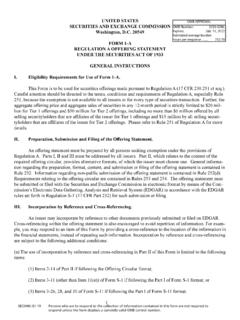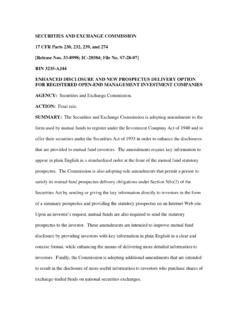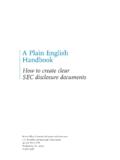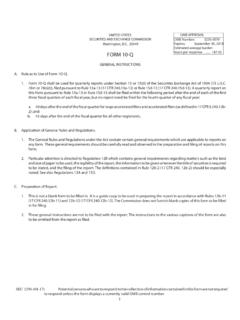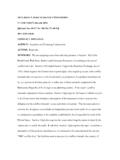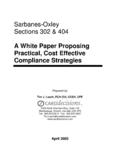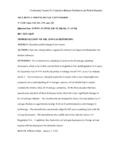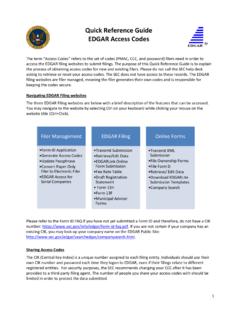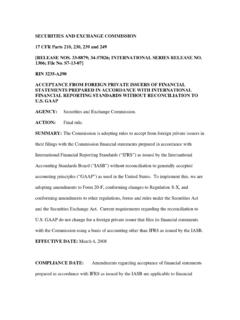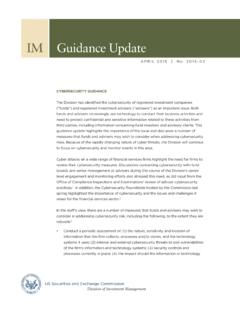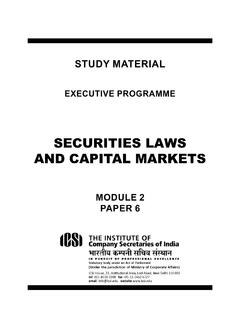Transcription of SECURITIES AND EXCHANGE COMMISSION 17 CFR Parts 229, …
1 1 SECURITIES AND EXCHANGE COMMISSION 17 CFR Par ts 229, 232, 240 and 249 [Release No. 33-11013; 34-93782; File No. S7-20-21] RIN 3235-AM86 Rule 10b5-1 and Insider Trading AGENCY: SECURITIES and Excha ng e C ommission. ACTION: Proposed rule. SUMMARY: The SECURITIES and EXCHANGE COMMISSION ( COMMISSION ) is proposing amendments to Rule 10b5-1 under the SECURITIES EXCHANGE Act of 1934. The proposed amendments would add new conditions to the availability of the affirmative defense under EXCHANGE Act Rule 10b5-1(c)(1) that are designed to address concerns about abuse of the rule to opportunistically trade SECURITIES on the basis of material nonpublic information in ways that harm investors and undermine the integrity of the SECURITIES markets. The COMMISSION is also proposing new disclosure requirements regarding the insider trading policies of issuers, and the adoption and termination (including modification) of Rule 10b5 1 and certain other trading arrangements by directors, officers, and issuers.
2 In addition, the COMMISSION is proposing amendments to the disclosure requirements for executive and director compensation regarding the timing of equity compensation awards made in close proximity in time to the issuer s disclosure of material nonpublic information. Finally, the COMMISSION is proposing amendments to Forms 4 and 5 to require corporate insiders subject to the reporting requirements of EXCHANGE Act Section 16 to identify transactions made pursuant to a Rule 10b5-1(c)(1) trading arrangement, and to disclose all gifts of SECURITIES on Form 4. DATES: Comments should be received on or before [INSERT DATE 45 DAYS AFTER PUBLICATION IN THE FEDERAL REGISTER]. ADDRESSES: Comments may be submitted by a ny of the f ollowing methods: 2 Electronic c omments: Use our Interne t c omment for m ( ); or Send an email to Please include F ile Number S7-20-21 on the subject line.
3 Paper comments: Send pape r c omments to Secretary, SECURITIES and Excha ng e C ommission, 100 F S treet, NE, Washing ton, DC 20549-1090. All submissions should refer to File Number S7-20-21. This file number s hould be included on the subject line if e mail is used. To help us proc ess and review your c omments more efficiently, please use only one method of submission. We will post all comments on our website ( ). Comments also are a va ilable f or w ebsite viewing and printing in our Public Reference R oom, 100 F S treet, NE, Washington, DC 20549, on official business days be tween the hours of 10:00 am and 3:00 pm. Operating conditions may limit access to the COMMISSION s public reference room. All comments received will be posted without cha nge. Persons submitting comments are cautioned that we do not redact or edit pe rsonal identifying infor mation from comment submissions.
4 You should submit only infor mation that you wish to make publicly available. We or the staff may add studies, memoranda, or other substantive items to the comment file during this rulemaking. A notification of the inclusion in the comment file of any such materials will be made available on our website. To ensure direct electronic receipt of such notifications, sign up through the Stay Connected option at to receive notifications by e-mail. FOR FURTHER INFORMATION CONTACT: Sean Harrison, Special Counsel, or Felicia Kung, Office Chief, Office of Rulemaking, at (202) 551-3430, Division of Corporation Finance, 3 100 F S treet NE, Washing ton, DC 20549. SUPPLEMENTARY INFORMATION: The COMMISSION is proposing amendments to: COMMISSION Reference CFR Citation (17 CFR) Regulation S-K [17 CFR through ] Item 402 Item 408 Regulation S-T [17 CFR through ] Item 405 SECURITIES EXCHANGE Act of 1934 ( EXCHANGE Act) [15 78a et seq.]
5 ] Rule 10b5-1 Schedule 14A Schedule 14C Rule 16a-3 Form 4 Form 5 Form 20-F Form 10-Q Form 10-K Table of Contents I. Introduction II. Discussion of the Proposed Amendments A. Amendments to Rule 10b5-1 1. Cooling-off Period 2. Director and Officer Certifications 3. Restricting Multiple Overlapping Rule 10b5-1 Trading Arrangements and Single- Trade Arrangements 4. Requiring that Trading Arrangements be Operated in Good Faith B. Additional Disclosures Regarding Rule 10b5-1 Trading Arrangements 1. Quarterly Reporting of Rule 10b5- 1(c) and non-Rule 10b5-1(c) Trading Arrangements 2. Disclosure of Insider Trading Policies and Procedures 3. Structured Data Requirements 4. Identification of Rule 10b5-1(c) and non-Rule 10b5-1(c)(1) Transactions on Forms 4 and 5 C. Disclosure Regarding the Timing of Option Grants and Similar Equity Instruments 4 Shortly before or after the Release of Material Nonpublic Information D.
6 Reporting of Gifts on Form 4 III. General Request for Comment IV. Economic Analysis A. Broad Economic Considerations B. Amendments to Rule 10b5-1(c)(1) 1. Baseline and Affected Parties 2. Benefits 3. Costs 4. Effects on Efficiency, Competition, and Capital Formation 5. Reasonable Alternatives 6. Request for Comment C. Disclosure of Trading Arrangements in New Item 408 of Regulation S-K and Mandatory Rule 10b5-1 Checkbox in Amended Forms 4 and 5 1. Baseline and Affected Parties 2. Benefits 3. Costs 4. Effects on Efficiency, Competition, and Capital Formation 5. Reasonable Alternatives 6. Request for Comment D. Additional Disclosure of the Timing of Option Grants and Related Company Policies and Practices (Amendments to Item 402 of Regulation S-K) 1. Baseline and Affected Parties 2. Benefits 3. Costs 4. Effects on Efficiency, Competition, and Capital Formation 5.
7 Reasonable Alternatives 6. Request for Comment E. Additional Disclosure of Insider Gifts of Stock 1. Baseline and Affected Parties 2. Benefits 3. Costs 4. Effects on Efficiency, Competition, and Capital Formation 5. Reasonable Alternatives 6. Request for Comment V. Paperwork Reduction Act A. Summary of the Collections of Information B. Estimates of the Proposed Amendments Effects on the Collections of Information C. Incremental and Aggregate Burden and Cost Estimates VI. Initial Regulatory Flexibility Act Analysis A. Reasons for, and Objectives of, the Proposed Action B. Legal Basis C. Small Entities Subject to the Proposed Rules D. Reporting, Recordkeeping, and Other Compliance Requirements E. Duplicative, Overlapping, or Conflicting Federal Rules F. Significant Alternatives G. Request for Comments VII. Small Business Regulatory Enforcement Fairness Act VIII. Statutory Authority 5 I.
8 Introduction Congress enacted the federal SECURITIES laws to promote fair and transparent SECURITIES markets, avoid[] frauds, and substitute a philosophy of full disclosure for the philosophy of caveat emptor and thus to achieve a high standard of business ethics in the SECURITIES industry. 1 The SECURITIES laws antifraud provisions that proscribe insider trading play an essential role in maintaining the fairness and integrity of our markets. We have long recognized that insider trading and the fraudulent use of material nonpublic information by corporate insiders2 not only harm individual investors but also undermine the foundations of our markets by eroding investor Congress has recognized the harmful impact of insider trading on multiple occasions and has authorized enhanced civil penalties specifically for insider Section 10(b) of the EXCHANGE Act is one of the SECURITIES laws primary antifraud Section 10(b) makes it unlawful to use or employ, in connection with the purchase or sale of any security, any manipulative or deceptive device or contrivance in contravention of such rules and regulations as the COMMISSION may prescribe.
9 6 The manipulative or deceptive 1 Affiliated Ute Citizens of Utah v. United States, 406 128, 151 (1972); accord Lorenzo v. SEC, 139 S. Ct. 1094, 1103 (2019). 2 The term corporate insider as used in this release, refers to officers and directors of an issuer. 3 See In re Cady, Roberts & Co., 40 907, 1961 WL 60638, at *4 (1961) ( A significant purpose of the EXCHANGE Act was to eliminate the idea that use of inside information for personal advantage was a normal emolument of corporate office. ); see also United States v. O Hagan, 521 642, 658 (1997) (The insider trading prohibition is consistent with the animating purpose of the federal SECURITIES laws : to insure honest SECURITIES markets and thereby promote investor confidence. ). 4 See Insider Trading Sanctions Act of 1984, Pub. L. No. 98-376, 98 Stat. 1264; Insider Trading and SECURITIES Fraud Enforcement Act of 1988, Pub.
10 L. No. 100-704, 102 Stat. 4677, codified at Section 21A of the EXCHANGE Act, 15 78u-1. Congress has enacted other laws that build on the insider trading prohibition. See, , Section 20(d) of the EXCHANGE Act [15 78t(d)]; Section 20A of the EXCHANGE Act [15 78t-1]; STOCK Act, Pub. L. No. 112-105, 126 Stat. 291. 5 15 78j(b). 6 Rule 10b-5, adopted pursuant to Section 10(b), prohibits the use of any device, scheme, or artifice to defraud ; the making of any untrue statement of a material fact or the omi[ssion] of a material fact necessary in order to make the statements made, in the light of the circumstances under which they were made, not misleading ; or any act, practice, or course of business which operates or would operate as a fraud or deceit upon any person. 6 device[s] or contrivance[s] prohibited by Section 10(b) and Rule 10b-5 (adopted thereunder) include the purchase or sale of a security of any issuer on the basis of material nonpublic information about that security or its issuer, in breach of a duty owed directly, indirectly, or derivatively, to the issuer of that security or the shareholders of that issuer, or to any person who is the source of the material nonpublic The COMMISSION adopted Rule 10b5-1 in August 2000 to provide more clarity on the meaning of manipulative or deceptive device[s] or contrivance[s] prohibited by EXCHANGE Act Section 10(b)
